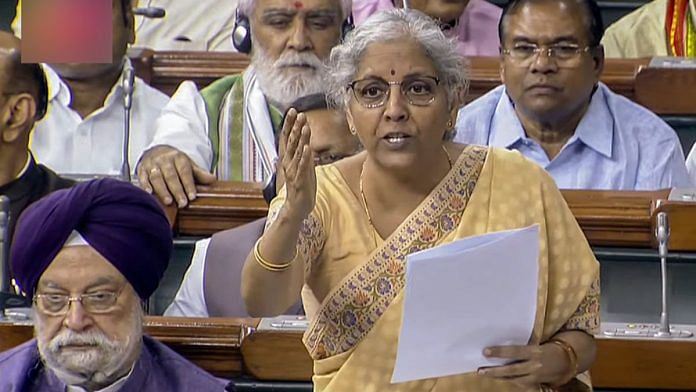New Delhi: India is in a “rare position of being optimistic and positive” about future growth, Finance Minister Nirmala Sitharaman said while speaking during the no-confidence motion debate in the Lok Sabha Thursday, while also launching scathing economic and political salvos at the Opposition.
While castigating the Opposition for being at the helm when India was designated as being part of the ‘Fragile Five’ economies and for launching schemes without any follow-through, Sitharaman also spoke about the steps this government has taken to eradicate poverty and to mitigate the current spike in the price of tomatoes.
“In 2013, Morgan Stanley classified India as being part of the ‘Fragile Five’ economies in the world, whereas now, that same Morgan Stanley has upgraded its outlook on India,” Sitharaman said, referring to last week’s decision by Morgan Stanley to upgrade India’s rating to ‘overweight’ from ‘equal weight’.
An overweight rating denotes that the economy is expected to do better in the future.
The finance minister also reeled off a list of sectors and areas where the Modi Government has significantly increased its expenditure as compared with the spending done in these areas under the UPA. In particular, she spoke about how capital expenditure by the government grew to Rs 10.9 lakh crore under the Modi government from Rs 3.92 lakh crore in 2014.
Similarly, she said that spending on agriculture has grown “five-fold” from about Rs 21,000 crore in 2014 to more than Rs 1 lakh crore currently.
Also Read: With NDA facing its 2nd ‘no-confidence’ motion in Lok Sabha, a look at what it is & how it works
From ‘aayega’ to ‘aa gaya’
“We used to hear ‘garibi hatao’ (earlier), but you can see we have been successful at reducing poverty. But there is more work to be done,” Sitharaman said.
On a number of indicators such as electricity, water, gas, housing, toilets, rural roads, highways, ports, and airports, Sitharaman said that while the UPA used to say “aayega” (will come), now the country is in a situation of “aa gaya” (has come).
“Every crisis and adversity has been transformed into a reform by us,” she added. “Where the 10 years of the UPA was a wasted decade known for corruption and crony capitalism. The real satisfaction is not only in launching schemes but in implementing them.”
“We believe in empowering all and appeasement of none,” she added.
The finance minister also reiterated Home Minister Amit Shah’s assertion that the reason the UPA changed its name to INDIA was because the people were associating the name UPA with corruption and crony capitalism.
“The people moved ‘no-confidence’ against UPA in 2014 and 2019 and defeated them,” Sitharaman said. “The situation will be the same in 2024.”
On the banking sector, the finance minister said that the government realises the need for the sector to be healthy and so has taken a number of measures to achieve this.
“Banks are able to work without political interference, they are working with professional integrity,” she said. “Banks mein failaya hua aapka raita hum saaf kar rahe hai (We are cleaning up the mess you made of the banks).”
Mitigating tomato price rise
Sitharaman said that the distribution of tomatoes through cooperative societies has started from 14 July and will continue in Bihar, West Bengal, Uttar Pradesh, Delhi and Rajasthan. She added that, in Delhi, mobile vans acting as outlets of the National Cooperative Consumers’ Federation of India (NCCF) and the National Agricultural Cooperative Marketing Federation of India (NAFED) were distributing tomatoes in Delhi.
“As on date, NCCF has distributed 8,84,612 kg of tomatoes in Rajasthan, Delhi-NCR and Uttar Pradesh and this will continue in the coming days and will be increased also,” she said. “Already the prices of tomatoes in the wholesale mandis in Andhra Pradesh and Karnataka have started coming down below Rs 100.”
“As of today, we have booked tomatoes through Kolar mandi (in Karnataka), coming to Delhi at Rs 85/kg,” she said, adding that the Indian government has also initiated imports from Nepal by removing import restrictions.
“The first lot of tomatoes from Nepal are likely to reach Varanasi and Kanpur by Friday itself,” she said.
(Edited by Zinnia Ray Chaudhuri)
Also Read: BJP sees red over Rahul’s ‘flying kiss’, Congress slams ‘tactic to divert attention from Manipur’



